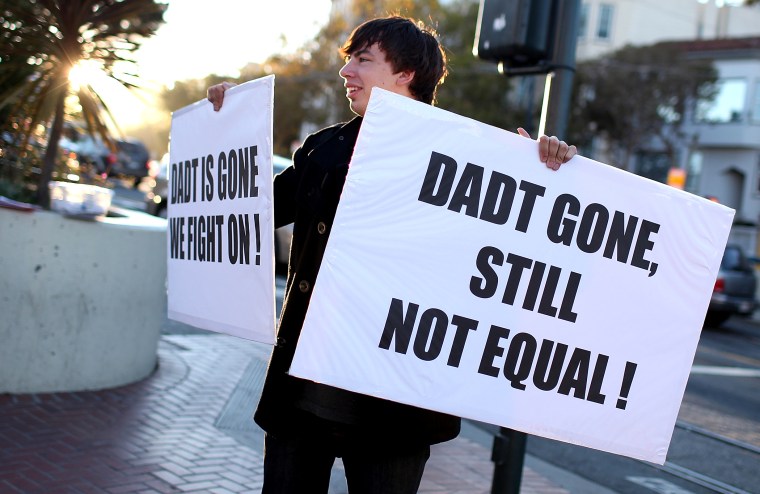Same-sex spouses of National Guardsmen can officially obtain benefits in any state, the Department of Defense announced on Friday, ending a period of resistance among several conservative holdouts.
“All military spouses and families sacrifice on behalf of our country,” said Secretary of Defense Chuck Hagel in a statement. “They deserve our respect and the benefits they are entitled to under the law.”
The announcement marked another major victory for LGBT advocates, though one that should have come three months earlier. Beginning in September, legally married same-sex couples were supposed to have been able to enroll in programs such as the military’s health and housing plans. But some red state National Guards were refusing to process applications.
Even though a June Supreme Court ruling cleared the way for federal agencies to recognize same-sex marriages, a majority of states still do not. And because National Guardsmen serve a dual mission--both to the state and federal governments--some worried the new policy would force certain service members into violating their state constitutions.
On Oct. 31, Hagel called out nine states that ban same-sex marriage--Indiana, Georgia, Florida, Mississippi, Louisiana, Oklahoma, South Carolina, Texas, and West Virginia--and directed them to comply with federal law. Following a period of review, each came to a solution.
Georgia, Louisiana, Mississippi, and Texas decided to place National Guard employees in a temporary federal status, as needed, when enrolling same-sex spouses in benefit programs. By contrast, Florida, Oklahoma, and South Carolina chose to limit enrollment operations for all spouses--regardless of sexual orientation--to just federal Guard units, not those that are state-owned. Meanwhile, Indiana and West Virginia landed on signing up same-sex couples for benefits at both state and federal Guard installations, without fussing with employee status.
LGBT advocates were largely happy with the outcome, though still annoyed by the extra hoops National Guard families would have to jump through.
“Any progress is good progress,” said Bruce Parker, coalition manager at Equality Louisiana, one of the states opting for a temporary status change whenever employees process benefit applications. “I don’t think temporary solutions are reasonable. And I don’t think states should feel like they have the ability to ignore federal policy coming from the Pentagon.”
“Obviously, we are very pleased that all of our military families will be able to access the benefits they deserve,” said Daniel Williams, legislative specialist at Equality Texas. “But the root of the problem is discriminatory laws, and until they’re removed, we’re going to continue to see these problems arise.”
Though National Guards receive both state and federal support, military experts say the amount of personnel that’s state-funded is only a fraction of the entire operation. Most of the time, said retired col. JAG officer Kevin Cieply, Guards are “following federal guidelines, federal directive, [and] spending federal funds.”
Some GOP governors, however, see it differently.
“As a state agency, the Texas Military Forces is bound by state law,” said Lucy Nashed, spokeswoman for Texas Gov. Rick Perry, via email. “We are pleased they were able to reach a solution that ensures no state resources or personnel are used in conflict with state law.”
Critics were hardest on the states that ceased benefit enrollment operations all together at state-owned installations. Though the change treats all couples equally, they argue, it still places an unnecessary burden on military families.
“I don’t think it’s fair for any citizen-soldier to be inconvenienced or for an obstacle or impediment to be thrown up in their way to getting the benefits they’re entitled to,” said Toby Jenkins, executive director of Oklahomans for Equality. “We have National Guard members in all 77 counties, and some of them are now having to drive hours to the nearest federal military base to file for their benefits.”
Alex Weintz, communications director for Oklahoma Gov. Mary Fallin, vehemently rejected that claim.
“At two state facilities that were processing marriage benefits, we moved the location of processing to nearby federal facilities,” he said. “It’s a change that has had little to no practical effect on the lives of National Guardsmen.”
